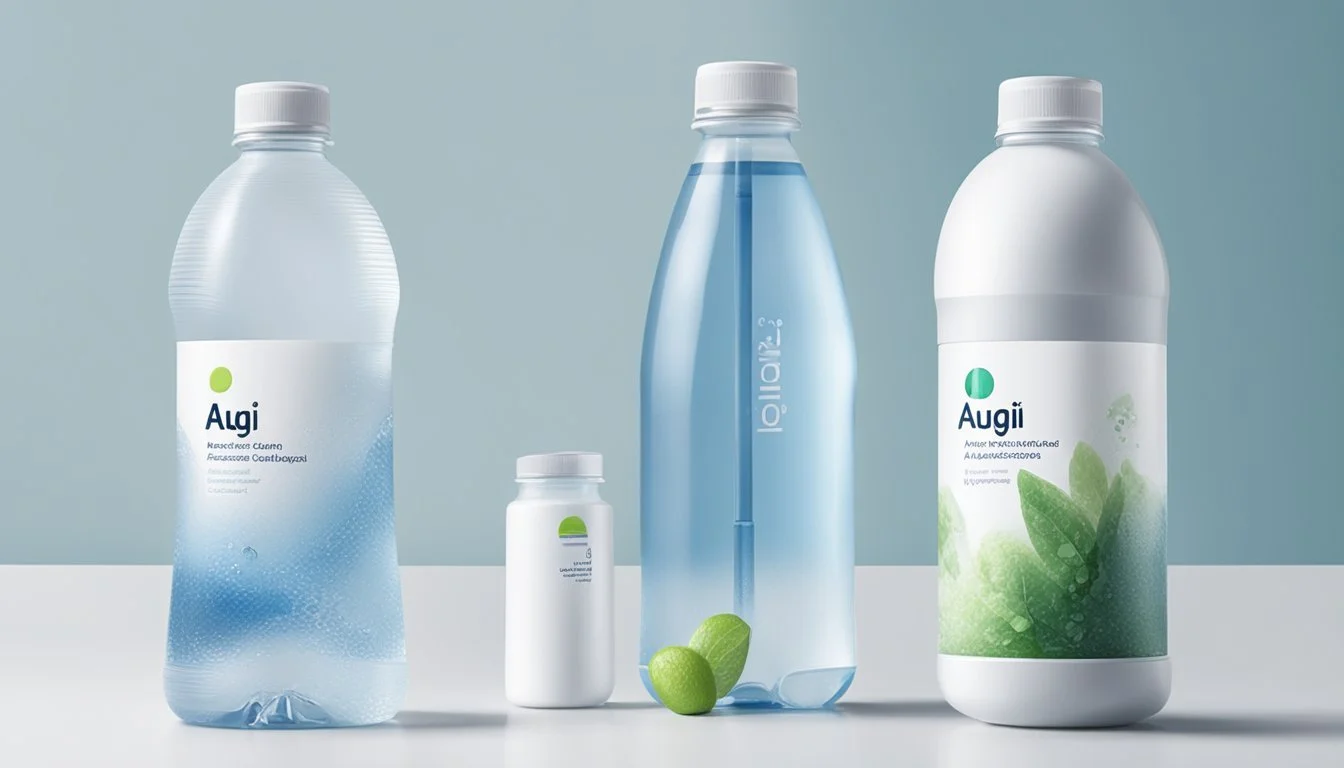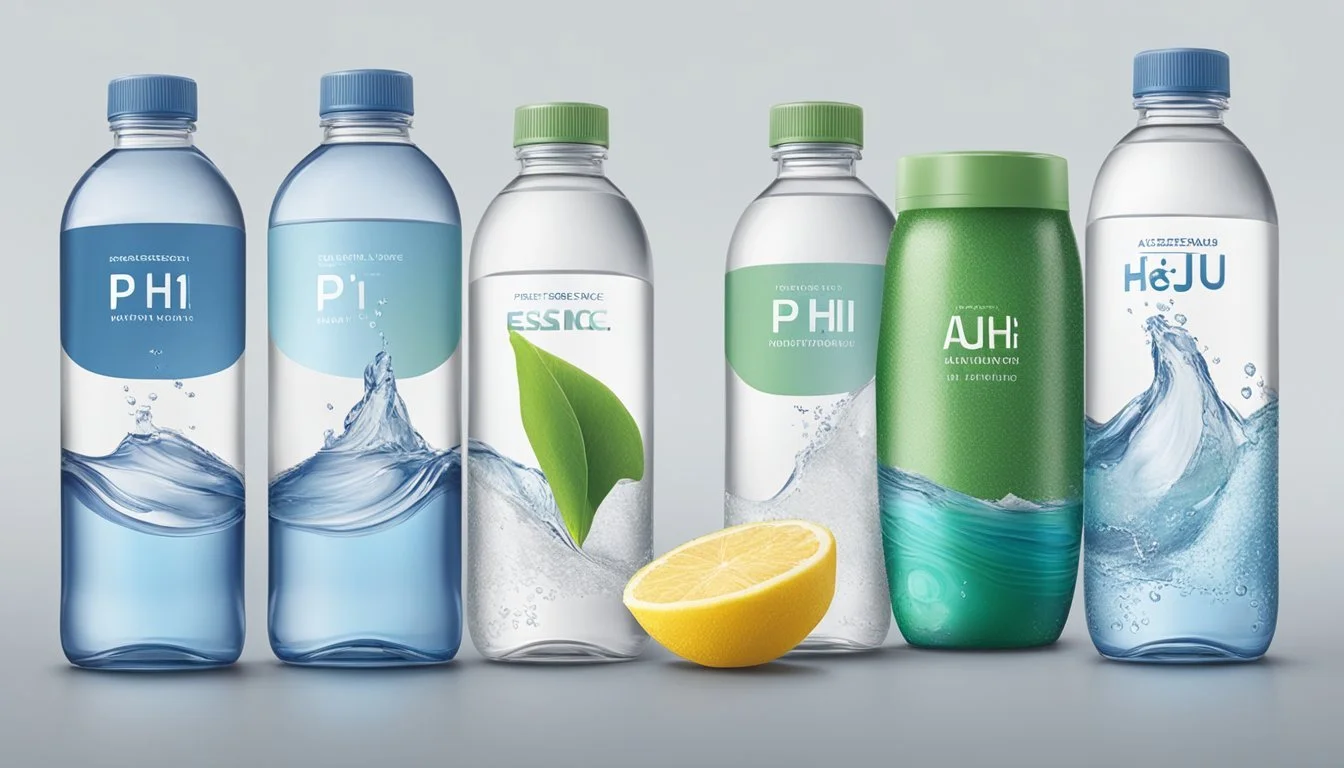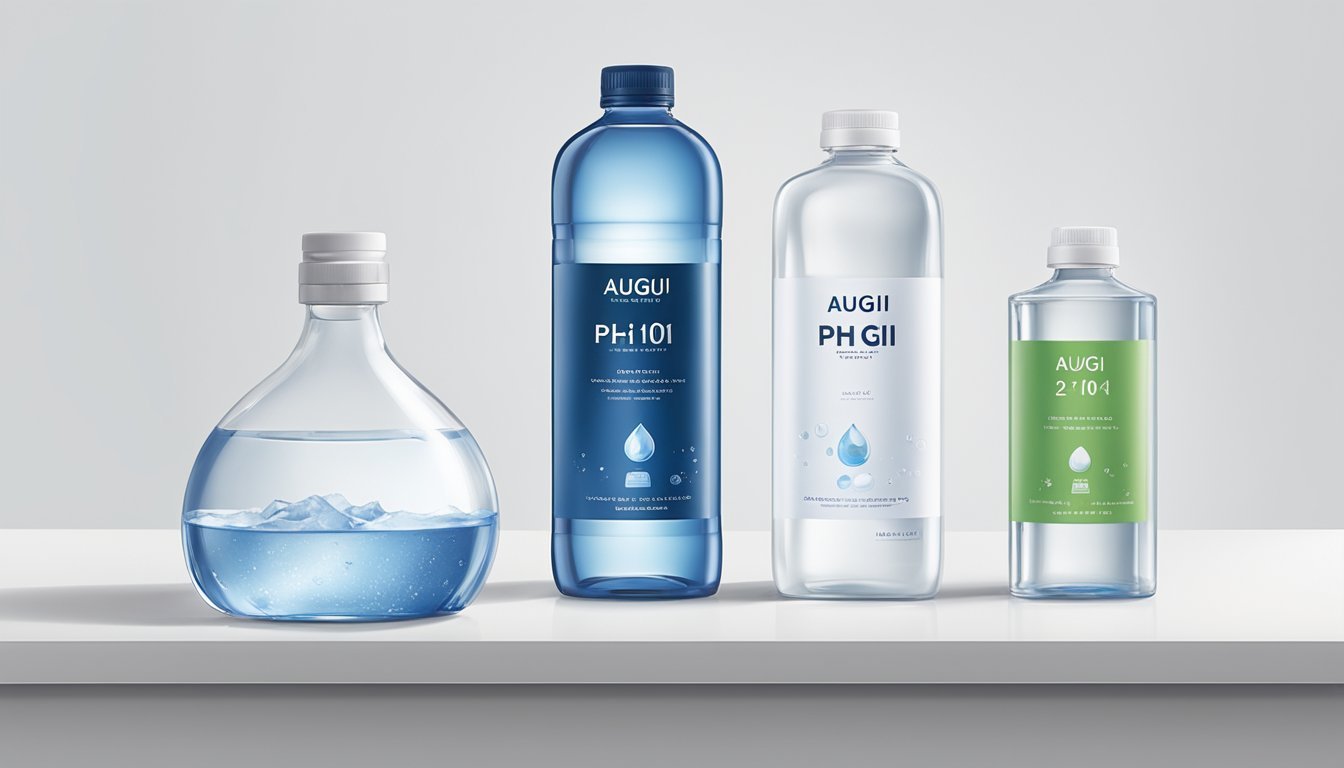Augi vs. Essence pH10
A Clear Comparison for Better Hydration
When it comes to bottled water, both Augi and Essence pH10 are popular choices among consumers. Augi, purified from the Leesburg, Va., municipal water supply, offers a clean, crisp taste with a unique mineral profile. Despite some unusual flavor notes, such as a slight hint of sulfur, it remains a strong contender for those seeking a reliable hydration source.
Essence pH10 stands out with its alkaline properties, promoting balanced pH levels and potential health benefits. Its composition includes essential electrolytes, making it an attractive option for those focused on maintaining proper hydration and mineral intake. For individuals prioritizing alkaline water, Essence pH10 offers a compelling choice.
Ultimately, the decision between Augi and Essence pH10 hinges on personal preference regarding taste and hydration needs. Augi provides a satisfying, pure drinking experience, while Essence pH10 caters to those looking for alkaline benefits and a well-rounded mineral profile.
Understanding pH in Bottled Waters
pH levels play a crucial role in the taste, safety, and health benefits of bottled water. Consumers often consider the pH balance when choosing between different brands.
The Significance of pH Levels
pH measures the acidity or alkalinity on a scale from 0 to 14. A pH of 7 is neutral. Values below 7 indicate acidity, while those above 7 indicate alkalinity. The ideal pH for drinking water ranges between 6.5 and 8.5. This range ensures a balanced taste without causing health concerns.
Acidic water (pH below 7) can be corrosive, potentially eroding tooth enamel and irritating the stomach. Conversely, excessively alkaline water (pH above 8.5) may affect the body's natural pH balance. Maintaining a balanced pH in bottled water helps avoid these issues and provides a more pleasant drinking experience.
pH Levels of Popular Bottled Water Brands
Different bottled water brands have varying pH levels. For instance, Waiakea water, sourced from Hawaii, has a pH range of 7.6 to 8.2. It is known for its naturally alkaline properties and unique mineral content.
Core Water undergoes a 7-step reverse osmosis process, resulting in a balanced pH level close to the human body's natural pH. Other brands, such as Pure Life, have a pH of 7.3, while Deer Park water is more acidic with a pH of 5.5. Understanding these differences helps consumers choose water that meets their preferences and health needs.
Testing and Interpreting pH Levels
Measuring the pH of bottled water involves several methods. Colorimetric indicators use color changes to indicate the pH level, while electronic pH meters provide more precise readings. Testing kits are readily available for consumers who want to verify the pH of their bottled water at home.
Interpreting the results can guide consumers in selecting water that avoids extremes of acidity or alkalinity. Maintaining a pH within the recommended range ensures the water is safe and enjoyable to drink. Being informed about the pH levels of different brands allows for better choices that align with personal health goals.
Components of Bottled Water
Bottled water contains various components, each contributing to its unique taste and potential health benefits. Key elements include electrolytes, minerals, and the processes used to purify the water.
A Closer Look at Electrolytes
Electrolytes, such as potassium, sodium, magnesium, and calcium, are vital for bodily functions. Electrolytes help regulate nerve and muscle function, hydrate the body, balance blood acidity and pressure, and aid in the repair of damaged tissues.
For instance, potassium supports muscle function and fluid balance. Sodium is crucial for maintaining blood pressure and volume. Brands like Essentia often highlight the presence of these electrolytes to market better hydration and performance benefits.
The Importance of Minerals
Minerals in bottled water, such as calcium, magnesium, and trace elements, contribute to both health and taste. Calcium is essential for bones and teeth, while magnesium supports muscle and nerve function.
Natural spring water often has a higher mineral content than purified water due to its natural filtration through rocks. These minerals can also influence the pH of the water, making it either more alkaline or acidic depending on their concentration.
Exploring Water Purification Processes
Water purification processes remove contaminants, making the water safe to drink. Common methods include reverse osmosis, distillation, and ozonation.
Reverse osmosis removes particles and impurities through a semipermeable membrane. Distillation boils water into vapor and then condenses it back into liquid, leaving impurities behind. Ozonation uses ozone gas to disinfect water, eliminating bacteria and viruses.
Each method impacts the water's mineral content and pH. For instance, reverse osmosis can strip water of beneficial minerals, while ozonation can affect its acidity. Understanding these processes helps consumers choose the right bottled water for their needs.
Health and Hydration Benefits
Understanding the health benefits of bottled water involves examining hydration needs, comparing bottled and tap water, and how bottled water fits into daily hydration routines.
Evaluating Hydration Needs
Hydration is crucial for maintaining bodily functions such as digestion, temperature regulation, and cognitive performance. Factors like age, activity level, and climate affect hydration requirements. Drinking water should be easily accessible and palatable to encourage consistent intake.
Essentia boasts a pH level of 9.5 or higher, marketed as "supercharged" water, which claims to provide superior hydration. While increased pH may offer benefits, scientific support for these claims remains limited.
Bottled Water vs. Tap Water
Bottled water like Essentia and Essence pH10 often undergo strict purification processes including reverse osmosis and microfiltration. This can result in water free from contaminants and consistent in taste.
Tap water, though regulated and often safe, can vary in quality due to pipes and local treatment methods. Also, environmental concerns favor tap water, as it generates less plastic waste and is cost-effective. Users should weigh convenience and safety when choosing.
The Role of Bottled Water in Daily Hydration
For individuals with higher hydration needs, such as athletes or those in hot climates, bottled water offers a convenient solution. Brands like Essentia provide options with added minerals or enhanced pH levels, potentially improving taste and encouraging more frequent consumption.
However, the best choice depends on personal preferences and lifestyle. Bottled water can support healthy hydration habits, particularly when access to clean tap water is limited.
Brand Comparison: Augi and Essence pH10
Augi and Essence pH10 offer unique attributes in taste, mineral content, and safety, making them both notable choices for bottled water enthusiasts. Below, each brand's key characteristics, benefits, and distinctions are examined.
Analyzing Augi Water's Properties
Augi water is recognized for its balanced pH level, typically around 7.5 to 8.0, ensuring a smooth and neutral taste. Augi sources its water from artesian springs, contributing to its clean and crisp flavor profile. The brand emphasizes the purity of its water, undergoing minimal processing to retain natural minerals.
Mineral content is a selling point, with Augi containing essential electrolytes, including magnesium and calcium. These minerals not only enhance taste but also contribute to hydration and overall wellness. Safety standards are stringent, with regular testing to ensure compliance with health regulations.
Essence pH10's Unique Features
Essence pH10 stands out due to its high pH level, often ranging from 9.5 to 10.0, categorizing it as highly alkaline water. This high alkalinity is believed to offer health benefits, such as neutralizing body acidity. Essence pH10 sources its water from natural springs, known for their purity.
Essence uses advanced filtration techniques, including reverse osmosis and UV treatment, to ensure safety and remove contaminants. The water is fortified with trace minerals like potassium and sodium, enhancing both taste and hydration. Packaging is environmentally conscious, often utilizing BPA-free bottles.
The Balance Between Taste and Safety
Both Augi and Essence pH10 prioritize taste and safety, albeit in different ways. Augi’s artesian source and natural mineral retention result in a clean, neutral taste without the tang of added chemicals. Essence’s high alkalinity provides a smoother taste profile favored by those sensitive to acidity.
Safety is a key consideration for both brands, with robust testing protocols in place. Augi focuses on maintaining natural purity, while Essence emphasizes advanced purification methods. The balance between taste and safety ensures both brands meet consumer expectations, offering reliable and refreshing hydration options.
Environmental Impact and Sustainability
Augi and Essence pH10 bottled waters differ significantly in their environmental impact and sustainability. The differences encompass various areas including plastic bottle usage and efforts toward eco-friendly practices.
The Push for Eco-Friendly Bottled Water
Both companies have leaned into environmentally friendly practices as consumer awareness grows. Augi's initiative uses recycled PET bottles, reducing its carbon footprint. Essence pH10 incorporates sustainable sourcing by minimizing water extraction from vulnerable sources.
Nestle, an industry giant, has set a benchmark by using more biodegradable plastics. This move helps to mitigate the adverse effects associated with plastic pollution. Companies like Amazon also offer a diverse range of eco-friendly bottled water options, encouraging competition and innovation.
Analyzing the Use of Plastic Bottles
Plastic bottle production generates an immense environmental footprint. The manufacturing process involves the release of considerable amounts of CO2. Augi measures its CO2 emissions to be around 1.6 to 22 oz per 50 oz bottle. Essence pH10 also reports similar figures, aligning closely with industry averages.
The negative impacts of plastic bottles extend to their end-of-life cycle. Most bottles end up in landfills or oceans, posing a significant threat to marine life and ecosystems. Heavy metals from bottle production can leach into soil and water, causing long-term environmental harm.
Both brands strive for sustainability, but the reliance on plastic remains a critical issue. Companies are now exploring alternatives like aluminum cans and biodegradables to address these concerns effectively.
Consumer Considerations
When choosing between Augi and Essence pH10, consumers often weigh factors such as price, convenience, and brand trustworthiness. Both brands offer unique attributes that appeal to different needs and preferences.
Price and Convenience
Price and convenience significantly impact consumer choices. Augi, a purified water sourced from the Leesburg, Va., municipal supply, is generally available at a lower price point. This affordability makes it more accessible for everyday use. It's often found in various retail locations, ensuring ease of purchase.
On the other hand, Essence pH10—which markets itself as having higher pH levels and enhanced minerals—typically commands a higher price. This premium cost might come from its unique composition. Availability may be more limited compared to Augi, often found in specialized or upscale stores.
Consumers seeking budget-friendly options might gravitate towards Augi, while those prioritizing perceived health benefits may prefer Essence pH10 despite the higher price.
Finding a Water Brand to Trust
Trust in a water brand is crucial, and factors like source transparency and purity play significant roles. Augi's transparency about sourcing from a municipal supply might raise concerns for some, though its purification process aims to ensure safety and quality.
Essence pH10 prides itself on pH balance and added minerals, appealing to consumers who prioritize such health benefits. Brands that disclose water origins and processing methods tend to foster greater consumer trust.
Consumers often look for third-party testing results and certifications. Engaging with brands that openly share this information can help buyers make informed decisions about their bottled water choices.
Expert Insights and Recommendations
Experts have conducted extensive testing on both Augi and Essence pH10 using various methods, including pH indicator paper. According to results from these tests, Essence pH10 consistently records a pH of around 9.5. This indicates a robust alkaline property, which is appealing for those seeking to balance acidity in the body.
Professionals in the hydration field often suggest that water with high alkalinity can aid in neutralizing acid levels in the stomach. Consistency and purity play a significant role in this recommendation. Essence undergoes a stringent purification process: micro-filtering, reverse osmosis, and ultraviolet exposure. These processes ensure Essence is 99.9% pure before electrolytes and minerals are added.
Augi, on the other hand, highlights its natural sourcing. Its pH level, while slightly lower than Essence, reflects a genuinely mineral-rich composition without the need for extensive processing. Geologists and natural water experts endorse Augi for its natural purity and minimal processing.
When evaluating the corrosiveness of both waters, neither shows significant corrosive properties, making them both safe for regular consumption. Nutritional experts often emphasize this aspect as an essential consideration for long-term use.
For those unsure about which option to choose, using pH indicator paper can offer a simple method to verify claims and make an informed decision. Testing home samples of both brands might help consumers feel more confident in their choice.
Recommendations generally sway towards personal preference, depending on the need for processed purity versus natural mineral content. Both Augi and Essence pH10 provide reliable options backed by expert validation.






